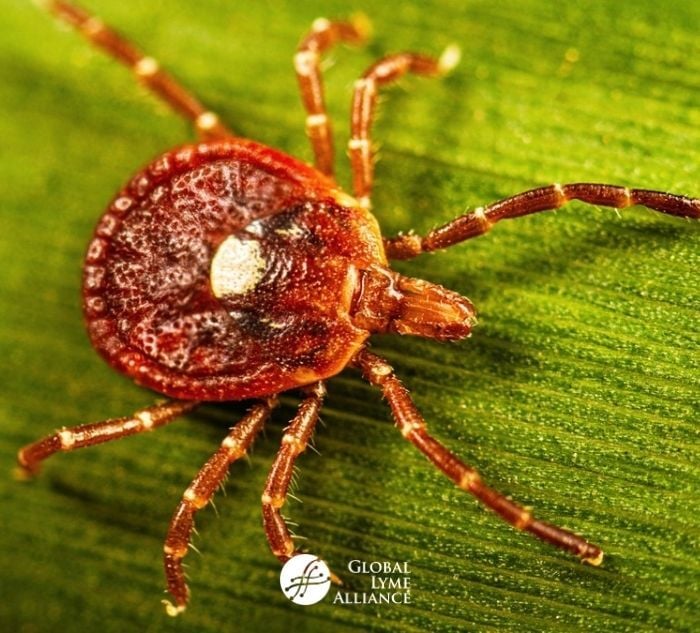
Part 1 of the Lyme and Nutrition Series, sponsored by RxSugar®
Learn about the crucial relationship between Lyme Disease, gut health, and inflammation. Discover practical strategies to optimize gut health and support well-being during your Lyme disease journey.
As both a registered dietitian (RD) and a Lyme disease patient, my journey has been marked by a unique perspective on the relationship between food, nutrition, health, and Lyme disease. Rather than simply telling you what to eat or not eat, I think a story about my first couple of years on this journey helps to illustrate both the personal struggle and professional expertise and how they've become intertwined.
In 2014, a single tick bite marked the beginning of my battle with Lyme disease. The initial year was troubled with relentless, migrating joint pain, swelling, and debilitating fatigue, and soon after acute neck stiffness, limiting my range of motion. Despite seeking medical guidance, numerous doctor visits left me with unanswered questions and escalating despair. What was happening to my body? And why couldn't anyone help?
Faced with a health crisis and no clear path forward, I made a decision to take control of my own journey. As a registered dietitian, I possessed the tools, knowledge, and skills to enact change for my patients, so why not myself? Armed with determination, I dove into researching gut health, food intolerances, and the interplay of nutrition and inflammation, particularly in autoimmune disorders. At the time, Lyme disease wasn't on my radar. I didn't know much about it.
Empowered by newfound insights, I approached my doctor armed with a litany of research findings, but despite efforts to alleviate my symptoms through dietary changes, my condition continued to deteriorate. While I did have relief from the joint pain, it wasn't as severe; the progression of the untreated and undiagnosed infection wreaked havoc on my body—leading to a heart murmur, dysregulated temperature control, and the onset of mild POTS (Postural Orthostatic Tachycardia Syndrome).
That still wasn't the extent of my symptoms—I had excruciating nerve pain, cognitive decline, and loss of my physical independence. Simple tasks became insurmountable challenges, requiring my husband's unwavering support, from basic hygiene to attending medical appointments by pushing me in a wheelchair.
I eventually was diagnosed and sought treatment from a Lyme-literate medical doctor (LLMD), embarking on a regimen of intensive antibiotic therapy. Despite initial skepticism surrounding antibiotic use, I made sure to focus on nutrition and ways to support my gut through the process. At each appointment, they would ask if I'd developed diarrhea, and they were surprised month after month when I kept saying "no."
A year and a half later, I switched to functional medicine. During my assessment with my new clinic, a stool sample was taken. The doctors were shocked at the result: a surprisingly healthy gut, defying expectations following prolonged antibiotic exposure.
Why do I share my own before telling you how I managed this?
This is not for admiration but to emphasize the transformative potential of prioritizing gut health amidst the complexities of Lyme disease. My experience emphasizes the pivotal role of gut health in inflammation, immune function, and supporting yourself through treatment and recovery.
In this blog post, we'll discuss actionable strategies for optimizing gut health, mitigating inflammation, and supporting well-being throughout your Lyme disease journey.
As one of the most common vector-borne diseases, Lyme can trigger systemic effects extending to various organs and systems, including the gastrointestinal (GI) tract. In this blog post, we'll discuss gut health and the crucial role of the gut microbiome in immune function. Understanding these connections can give us valuable insight into managing Lyme disease symptoms and supporting recovery. Knowledge is one of the most powerful tools in our Lyme disease management toolkit.
While Lyme disease can lead to Gl symptoms, the part we're focused on here is the inflammatory response triggered by Lyme disease and how it can upset the balance of our gut microbiome, contributing to gut dysbiosis, which is an imbalance in the composition and diversity of the microbial community that live in our gut.
Picture the gut microbiome as a garden. Within it, bacteria, fungi, and viruses live, ideally, in a beautiful symbiotic environment. However, weeds can grow if that balance is tipped into less favorable conditions. We need to water and fertilize the garden, protect it from invaders, and weed it. This theory applies to our gut microbiome as well.
Seventy to eighty percent of the body's immune system lives in the gut, making it a critical site for immune function and regulation and a key place to focus our attention. Imbalances in gut bacteria can worsen inflammation, weaken the immune response, and compromise overall health, potentially worsening symptoms and complicating recovery from Lyme disease.
Maintaining a healthy gut through dietary changes, probiotics, and lifestyle adjustments can support managing Lyme disease symptoms and enhancing well-being before, during, and after treatment.
What is "gut health"?
When we say "gut health," we refer to an optimal balance and function of the GI tract and the trillions of microorganisms living within it, known as the "gut microbiota." Our food and lifestyle choices have an enormous effect on our gut health.
Suppose your gut doesn't get enough nutrients and care, and you also have a Lyme diagnosis. In that case, it can lead to chronic inflammation and increased intestinal permeability, commonly known as "leaky gut." There is an overlapping connection between all of these, as you can see in the diagram:

A more permeable ("leaky") gut lining allows "invaders" to pass into the bloodstream, triggering more immune activity and inflammation. Leaky gut may also be involved in the development of some autoimmune disorders.
Each person's gut has a unique mix of microorganisms, and what we eat can significantly impact the types of microorganisms living in our gut, affecting the composition of our gut microbiota. Dietary changes can alter microbial diversity, composition, and stability.
Why is our gut health tied to our overall health?
Our GI tract is responsible for many important body tasks, like digestion and nutrient absorption. Its job is to break down food, absorb nutrients, and eliminate waste, which is also part of the process many refer to as "detoxing." Simply put, we need to absorb the nutrients in our food, and then the body removes the waste when we have regular bowel movements. Hormone regulation and neurotransmitter production also happen in the gut.
A balanced gut microbiome helps regulate our immune response, protecting against pathogens and reducing the risk of inflammatory conditions. Lyme disease often puts many of us in an inflammatory state, so we want to focus on managing the inflammation as much as possible. An imbalanced gut microbiome can lead to chronic inflammation, which is associated with various diseases, including Lyme disease, inflammatory bowel disease, autoimmune conditions, and metabolic disorders.
You might even be surprised to know that gut health is linked to mental health. The gut and brain communicate through the gut-brain axis. Neurotransmitters and other signaling molecules are produced in the gut and can affect mood, cognition, and behavior. Imbalances in gut bacteria have been linked to undesirable mental health outcomes.
To summarize, an unhealthy gut microbiome balance can lead to poor nutrient absorption, hormone and neurotransmitter changes, more inflammation, an overactive immune response, poor mood, and problems thinking and concentrating.
What foods can worsen your gut health?
Gluten can trigger an inflammatory response in some people, potentially worsening symptoms such as joint pain, fatigue, and neurological issues associated with Lyme disease. It can also lead to a "leaky gut," as we talked about earlier.
Sugar triggers pro-inflammatory cytokines, contributing to systemic, whole-body inflammation. Cytokines can cause your body to produce more substances that make it swell and hurt. Sugar can also tip the balance of good and bad bacteria in your gut, leading to what we call "dysbiosis."
What foods can help improve gut health?
Prebiotics help feed the good bacteria in our gut, and you can find those in foods that are high in fiber because fiber acts as the prebiotic. During the bacteria feed off these fibers, fermentation occurs, producing short-chain fatty acids. These short-chain fatty acids serve as an energy source for cells in our large intestine and contribute to maintaining the structure of the intestinal barrier (keeping the gut from becoming "leaky") by promoting mucin production and increasing tight junction proteins.
Food sources of polyphenols, an antioxidant that is found in fruits, vegetables, nuts, seeds, and whole grains, also have prebiotic effects on the gut microbiota. They can help the growth of beneficial bacteria and inhibit the growth of harmful pathogens, contributing to a healthier gut environment.
Let's put it together simply:
I know everyone loves a good "Do's and Don'ts" list, so to keep this hands-on and easy to use, I've summarized it all here:
Do's:
- Focus on getting fiber into your diet by eating various plant-based foods.
- Include foods with fibers that our body can use as prebiotics: garlic, onion, leek, asparagus, bananas, apples, and gluten-free whole grains (oats, rice, quinoa, millet).
- Consume whole, unrefined, unprocessed foods rich in phytonutrients that have an antioxidant (inflammation-fighting) effect on the body: colorful vegetables and fruits, cauliflower, nuts, seeds, and whole grains.
- Include good fats like avocados, olive oil, and omega-3-rich foods (sardines, herring, salmon).
- Try adding foods like bone broth, it is a source of collagen, gelatin, and amino acids, which can help repair the intestinal lining and support the growth of beneficial gut bacteria.
- Sip on matcha green tea; it is an excellent source of polyphenol antioxidants (make it from scratch, not the processed, bottled kind that is loaded with sugar)
- Add in fermented foods for a source of probiotics; this includes foods like fermented sauerkraut, pickled vegetables, Kimchi, water kefir, milk kefir if tolerated (unsweetened), miso, unpasteurized apple cider vinegar (ensure the label says "contains mother"), kombucha, and coconut yogurt (unsweetened)
- Identify food sensitivities (usually done by some form of an elimination diet) and avoid those foods.
- Non-food suggestions: Probiotics, and if on antibiotics or recovering from them, consider Saccharomyces boulardii as well. It has been studied for its potential to prevent C. diff for those undergoing antibiotic treatment.
- Regular exercise (light to moderate, not intense, over-training) promotes blood flow to the gut, which can help with inflammation and help move food through the GI tract.
- Stress management includes meditation, yoga, deep breathing, and massage to promote relaxation and calm the nervous system.
- Speak to your health care practitioner or pharmacist about taking supplements such as multivitamins, fish oil, vitamin D to help reduce inflammation, and L-glutamine if leaky gut is suspected.
Don'ts:
- Sugar and refined carbohydrates are mostly found in packaged and convenience processed foods. Removing processed foods makes it easier to remove the various forms of added sugars, including high fructose corn syrup.
- Remove gluten and focus on gluten-free whole grains and starchy root vegetables instead.
- Remove inflammatory fats, such as refined oils, and trans fats, such as vegetable oils, soybeans, corn, sunflower, safflower, canola, cottonseed, and margarine. These have high levels of omega-6 fatty acids, which can promote inflammation when consumed in excess, especially when the ratio of omega-6 to omega-3 fats is imbalanced.
- Remove or limit alcohol.
- Sugar substitutes
If you're looking for some Lyme-friendly recipe ideas, you're welcome to download my recipe e-book for breakfast, lunch, and snack ideas that are all gluten, dairy, and sugar-free. Grab your copy here: https://freebie.sarabrunner.com/recipebook
****
Thank you to RxSugar® for being the Official Sponsor of our Lyme and Nutrition Series. RxSugar® products are a great natural sugar alternative to refined sugar. RxSugar®'s plant-based certified Sugar, Syrup and Chocolate Snacks are USDA Organic, keto certified, grain & gluten-free, FODMAP friendly certified, vegan with zero blood sugar impact. Use discount code GLA20 at checkout at https://rxsugar.com/
*GLA Contributor and Author not compensated by brand for this post
The above material is provided for information purposes only. The material (a) is not nor should be considered, or used as a substitute for, medical advice, diagnosis, or treatment, nor (b) does it necessarily represent endorsement by or an official position of Global Lyme Alliance, Inc. or any of its directors, officers, advisors or volunteers. Advice on the testing, treatment or care of an individual patient should be obtained through consultation with a physician who has examined that patient or is familiar with that patient’s medical history.

Sara Brunner, RD
GLA Contributor
Opinions expressed by contributors are their own. Sara Brunner is a Registered Dietitian (RD) hailing from Canada. In 2014, Sara experienced a significant health challenge after being bitten, initially diagnosed as a spider bite. Despite seeking medical advice, she remained untreated and eventually found herself bed-bound within two years. Throughout this period of undiagnosed illness and escalating symptoms, Sara took proactive measures to manage her health, drawing upon her expertise as a Registered Dietitian. In 2016, Sara received a Lyme+ diagnosis, marking the beginning of her journey towards recovery. It wasn't until 2022 that she began to witness significant improvements. Despite the prolonged and challenging nature of her journey, Sara remained determined. During this time, she focused on developing The Universal Lyme Diet (ULD), a self-paced online course designed to empower individuals with Lyme disease to create personalized nutrition management plans. Scheduled for release in late 2024, the ULD offers a systematic framework tailored to each individual's needs. In the interim, you can join the waitlist for the ULD by visiting: https://training.sarabrunner.com/uldwaitlist For more insights and practical tips on navigating your Lyme journey, follow Sara on Instagram: @thelymedietitian







-2.jpg)